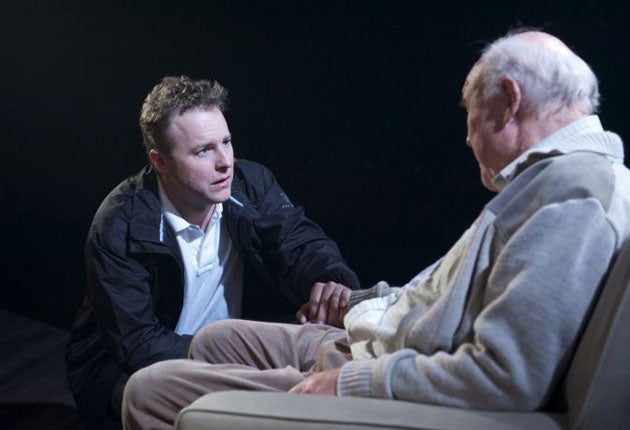A Number, Menier Chocolate Factory, London

Your support helps us to tell the story
From reproductive rights to climate change to Big Tech, The Independent is on the ground when the story is developing. Whether it's investigating the financials of Elon Musk's pro-Trump PAC or producing our latest documentary, 'The A Word', which shines a light on the American women fighting for reproductive rights, we know how important it is to parse out the facts from the messaging.
At such a critical moment in US history, we need reporters on the ground. Your donation allows us to keep sending journalists to speak to both sides of the story.
The Independent is trusted by Americans across the entire political spectrum. And unlike many other quality news outlets, we choose not to lock Americans out of our reporting and analysis with paywalls. We believe quality journalism should be available to everyone, paid for by those who can afford it.
Your support makes all the difference.Caryl Churchill's play could not, at first glance, be more topical – on the day of its opening, the doctor who developed IVF won a Nobel Prize. But, on second hearing, the 50-minute two-hander seems less impressive than when Michael Gambon and Daniel Craig performed it on its premiere in 2002 or when Timothy and Sam West, the current cast, did so in Sheffield in 2006.
In fragmented, overlapping sentences, a father and son pursue, evade, and circle each other, their versions of the past shifting as they speak. The young man learns that he is a clone of an earlier son, but that that one is dead, though – well, actually... The discarded child steps out of the shadows, and the cloned son is physically terrified of his rival, and emotionally terrified by the dilution of his identity – he has discovered that the cloning doctor, without the father's knowledge, made 21 more.
What such a play needs is a poetic atmosphere, everyday but eerie, with diction that, while clipped, reverberates. A Number, however, makes one recall the old criticism of Pinter, that his underwritten characters merely perform actors'-workshop exercises of unmotivated emotion. It's a play that, with its hints of various contentious topics (nature vs nurture, technology vs humanity), is less appealing to audiences than to leader writers and other high-minded people.
Jonathan Munby's production – I liked the glass ceiling studded with rows of test tubes – serves the play up with style. Timothy West is a bit too nice for the father, whose switch from defensiveness to self-abasement sounds like a changing ploy of exculpation. But Sam West, as both beloved son and rejected thug, one whose vulnerability is expressed in fear, the other in hatred, gives the play some of the quality of ghostly, tugging fingers missing in the text.
To 5 November (020 7907 7060)
Join our commenting forum
Join thought-provoking conversations, follow other Independent readers and see their replies
Comments